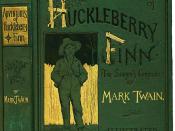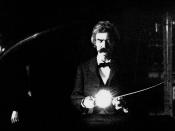The Adventures of Huckleberry Finn: Overview
Critic: Guy A. Cardwell
Source: Reference Guide to American Literature, 3rd ed., edited by Jim Kamp, St. James Press, 1994
Criticism about: Samuel Langhorne Clemens (1835-1910), also known as: Samuel Clemens, Samuel Langhorne Clemens, Sieur Louis de Conte, Quentin Curtius Snodgrass, Thomas Jefferson Snodgrass
Mark Twain conceived of what became Adventures of Huckleberry Finn in the summer of 1875, began to write the following summer, and after long interruptions completed a manuscript with a rush in 1883. It was to be a boys' book, a sequel to The Adventures of Tom Sawyer; yet even the first reviewers saw some ambiguity about its proper audience. What Twain himself seems never fully to have understood is the extent to which the book moved during composition towards the adult and the serious or how superior it is to his other works.
Appealing to a broad spectrum of readers, the book gained an immediate popular success.
Although several reviewers objected to its violence and to the bad models it set for boys, most liked it for his comedy, characters, and pictures of life in the Mississippi Valley of about 1840. It was easy to feel sympathy in the mid-1880s for Twain's praise of freedom and condemnation of slavery. Industrial capitalism had brought tensions; images of peace, individual liberty, dozing villages, and harmony with Nature had general appeal. The myth of the West was potent everywhere.
More recently, optimistic readings have declined, and emphasis has been placed on themes and thematic images that run counter to primary American ideologies and mentalités of the past century. The book now appears to imply more than a distaste for a slave society: the Old South is metonymic. All society is coercive; men are greedy. The novel subverts the assumptions...


